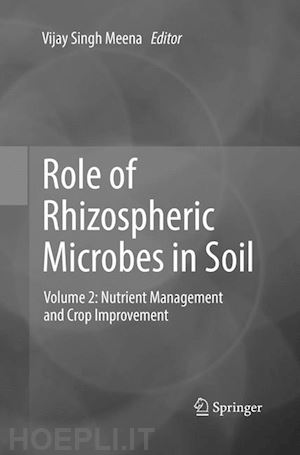
Questo prodotto usufruisce delle SPEDIZIONI GRATIS
selezionando l'opzione Corriere Veloce in fase di ordine.
Pagabile anche con Carta della cultura giovani e del merito, 18App Bonus Cultura e Carta del Docente
In any ecosystem, plant and microbe interaction is inevitable. They not only co-exist but also support each other’s survival and also provide for sustenance in stressful environment. Agro-ecosystems of many regions around the globe are affected by multi-stress. Major limiting factors affecting the agricultural productivity worldwide are environmental stresses. Apart from decreasing yield they introduce devastating impact on plant growth as well. Plants battle with various kind of stresses with the help of symbiotic association with the microbes in the rhizosphere. Naturally existing plant-microbe interaction facilitates survival of plants under these stressful conditions.
Rhizosphere consists of many groups of microbes, plant growth-promoting bacteria (PGPB) is one such group of microbes which assist plants in coping with multiple stresses and in plant growth as well. These microbes help in stress physiology of the plants and can be extremely useful in solvingagricultural as well food security problems.
The proposed book is split into two parts, with an aim to provide comprehensive description and highlight a holistic approach. It elucidates various mechanisms in rhizosphere of nutrient management, stress tolerance and enhanced crop productivity. The book discusses rhizospheric flora and its importance in enhancement of plant growth, nutrient content, yield of various crops and vegetables as well as soil fertility and health. Both volumes of the book addresses fundamentals, applications as well as research trends and new prospects of agricultural sustainability. Volume 2: Nutrient Management and Crop Improvement, contains chapters which cover a broad overview of plant growth promoting activities of microbes. This proposed book also highlights the contribution of nitrogen, phosphorus, potassium, iron and zinc-solubilizing microbes from rhizospheric soil to develop efficient indigenous microbial consortia to enhance the food and nutritional security. With the given content and layout the proposed book will be an all-inclusive collection of information, which will be useful for students, academicians, researchers working in the field of rhizospheric mechanisms, agricultural microbiology, soil microbiology, biotechnology, agronomy and sustainable agriculture and also for policy makers in the area of food security and sustainable agriculture. It will be of special interest to both academics and professionals working in the fields of microbiology, soil microbiology, biotechnology and agronomy, as well as the plant protection sciences. Timely, this edited and research book provides an essential and comprehensive source of material from basic to advance findings on microbes and their role in agricultural and soil sustainability.
Towards the plant beneficiary rhizobacteria (PBR) and agricultural sustainability.- Soil microbial hotspots and hot moments: management vis-a-vis soil biodiversity.- Microbes: a sustainable approach for enhancing nutrient availability in agricultural soils.- Impact of land uses on microbial biomass C, N, P and microbial population in Indian Himalaya.- Molecular and physiological characterization of plant growth promoting rhizobacteria: methods and protocols.- Microbial transformation of sulphur: an approach to combat the sulphur deficiencies in agricultural soils.- Plant growth promoting rhizobacteria (PGPR) and its role in sustainable agriculture: Present status and future prospective.- Towards the nutrient immobilization and mineralization in soil nitrogen.- Towards the bio-availability of zinc in agricultural soils.- Free living and associative symbiotic nitrogen-fixing microorganisms.- Phosphate solubilizing microbes: diversity and phosphates solubilization mechanism.- Role of phosphate solubilizing microbes in the enhancement of fertilizer value of rock phosphate through composting technology.- Use of plant growth promoting Burkholderia species with rock phosphate solubilizing potential towards crop improvement.- Zinc solubilizing bacteria for zinc biofortification in cereals: a step towards sustainable nutritional security.- Application and mechanisms of plant growth promoting fungi.- Towards the microbial transformation of phosphorus in agricultural soils.- Towards the mechanisms of nutrients solubilization and fixation in soil system.- Role of PGPR in sustainable agriculture: molecular approach towards disease suppression and growth promotion.











Il sito utilizza cookie ed altri strumenti di tracciamento che raccolgono informazioni dal dispositivo dell’utente. Oltre ai cookie tecnici ed analitici aggregati, strettamente necessari per il funzionamento di questo sito web, previo consenso dell’utente possono essere installati cookie di profilazione e marketing e cookie dei social media. Cliccando su “Accetto tutti i cookie” saranno attivate tutte le categorie di cookie. Per accettare solo deterninate categorie di cookie, cliccare invece su “Impostazioni cookie”. Chiudendo il banner o continuando a navigare saranno installati solo cookie tecnici. Per maggiori dettagli, consultare la Cookie Policy.